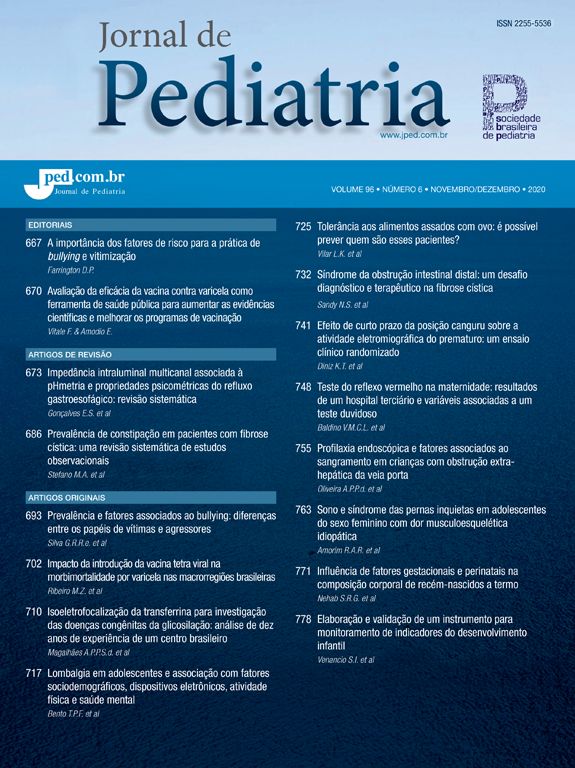To evaluate the maternal perceptions and attitudes related to adherence to healthcare professionals’ guidelines on breastfeeding and complementary feeding, and associated factors.
MethodsA cross-sectional analysis of data from a randomized field trial was performed, in which 20 health centers (HCs) were selected in the city of Porto Alegre, state of Rio Grande do Sul, from eight Health Management Districts of the city. Pregnant women were selected from these HCs, and when the children were aged between six and nine months, data regarding the maternal perception of adherence to professional advice and consequences of feeding practices on child health were obtained during home visits. Association analyses were performed using Poisson regression.
ResultsData were collected from 631 mother-child binomials. According to the mothers’ perception, 47% reported not following instructions received in the HC. Among these, 45.7% did not recognize the importance of eating habits for the child's health. The perception of adherence to professional advice was associated with higher prevalence of exclusive breastfeeding (EBF), introduction of solid food (ISF) after four months, introduction of non-recommended foods after six months, and higher family income. A higher prevalence of EBF and ISF was observed after four months (p < 0.05) among mothers who believed in the importance of feeding habits for the child's health.
ConclusionThere was a high prevalence of mothers who did not follow the advice of health professionals; the perception that food does not affect the child's health can be a barrier to the improvement of eating habits in childhood.
Avaliar a percepção e as atitudes maternas relacionadas à adesão às orien- tações de profissionais de saúde sobre aleitamento materno e alimentação complemen- tar e fatores associados.
MétodosAnálise transversal de dados de ensaio de campo randomizado, em que foram sorteadas 20 Unidades de Saúde (US) de Porto Alegre-RS das oito gerências distritais de saúde do município. Gestantes atendidas nestas US foram selecionadas e, aos 6-9 meses de idade das crianças, foram obtidos, em visitas domiciliares, dados quanto à percepção materna de adesão às orientações dos profissionais e de consequências das práticas alimentares na saúde da criança. Análises de associação foram realizadas por meio de Regressão de Poisson.
ResultadosForam obtidos dados de 631 binômios mãe-criança. Conforme a percepção das mães, 47% relataram não seguir orientações recebidas nas US. Dentre essas, 45,7% não reconhecem a importância da alimentação para a saúde da criança. A percepção de adesão às orientações dos profissionais foi associada com maiores prevalências de aleita- mento materno exclusivo (AME), introdução de alimentos sólidos (IAS) após quatro meses e introdução de alimentos não recomendados após seis meses, além de maior renda familiar. Observaram-se maiores prevalências de AME e IAS após quatro meses (p < 0,05) entre as mães que acreditam na importância da alimentação para a saúde da criança.
ConclusãoHouve elevada prevalência de mães que não seguem as orientações dos pro- fissionais de saúde e a percepção de que a alimentação não influencia a saúde da criança pode ser uma barreira para melhorias nas práticas alimentares na infância.
Como citar este artigo: Broilo MC, Louzada ML, Drachler ML, Stenzel LM, Vitolo MR. Maternal perception and attitudes regarding healthcare professionals’ guidelines on feeding practices in the child's first year of life. J Pediatr (Rio J). 2013;89:485-91.








